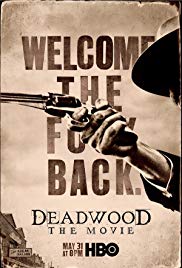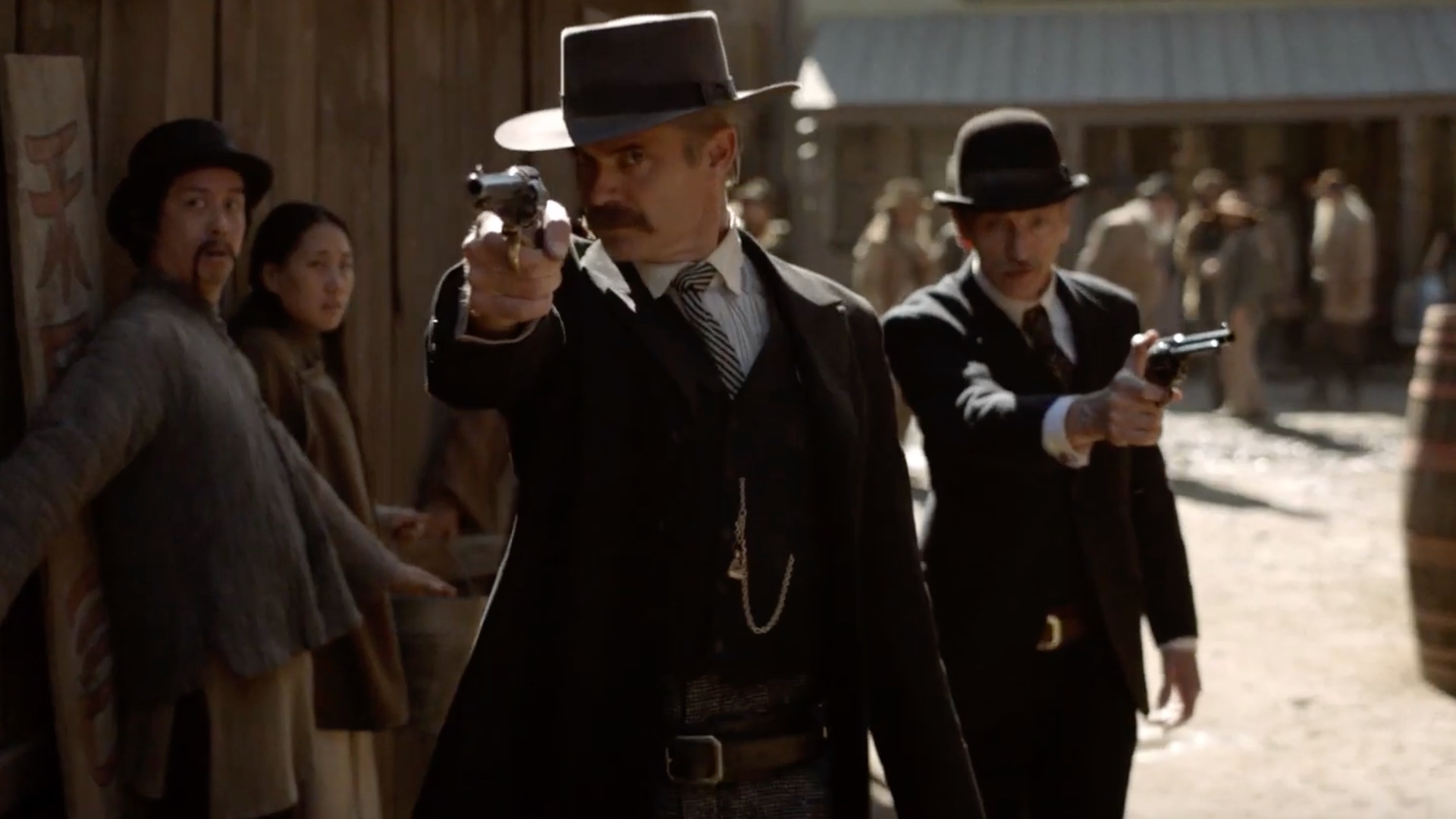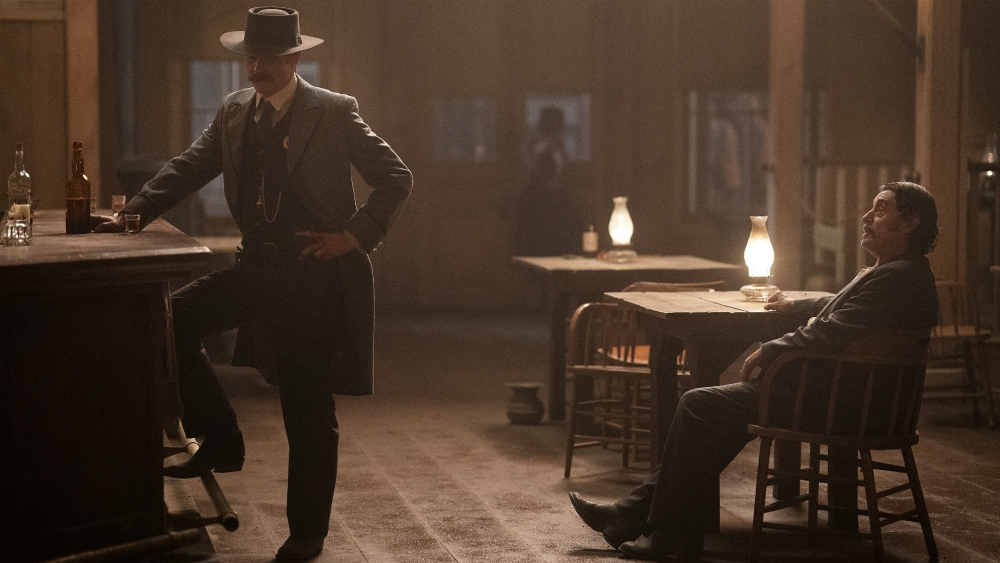DEADWOOD: THE MOVIE

Starring: Timothy Olyphant, Ian McShane, Molly Parker, Paula Malcomson, John Hawkes, Brad Dourif, Robin Weigert, Gerald McRaney
Director: Daniel Minahan
Writer: David Milch
Hearst won’t take long ‘fore he honors the rigors of his putrid fucking nature.
Deadwood is the greatest TV show of all-time.
Of course, there are arguments to be made for shows like The Sopranos, The Wire, The Twilight Zone. Hell, even personal favorites like Lost, The Leftovers, or Homicide: Life on the Street are in the running. But anytime I watch Deadwood — or even think about it, honestly — it occupies my mind and my spirit for a while.
That’s why I was so happy to so quickly let my worries slide away and embrace the fact that Deadwood: The Movie is of a piece with the original series. It’s not only a fitting capstone, but it’s also a lovely time capsule and an effective film in its own right. If you came to the movie with fresh eyes, you wouldn’t get as much out of it thematically, emotionally, or philosophically, but you’d definitely have a perfectly good time.
Deadwood opens with progress coming to the titular town. A train is flying down those tracks, barrelling through a tunnel, spewing smoke and making its way to Deadwood no matter what. It’s not the last sign of progress; we also see telephone poles being erected. Deadwood is now a town celebrating the fact that it will be entering the Union as a part of South Dakota. Ten years have passed but, to my surprise, the story follows closely from where it left off, like a poorly scabbed wound picked.
Deadwood’s reluctant Sheriff, Seth Bullock (Timothy Olyphant) is now a U.S. Marshall, a fortuitous upgrade for both the character and the actor. Al Swearengen (Ian McShane) still runs the Gem, Sol Starr (John Hawkes) and Trixie (Paula Malcomson) are still in love, Alma Ellsworth (Molly Parker) is still yearning, and Calamity Jane (Robin Weigert) still drinks. None of these are necessarily surprises, and they aren’t the extent of the former characters we get to meet advanced a decade, but it all feels right.
The Junior Senator from California, George Hearst (Gerald McRaney), is returning to the site of his frustration and continuing fortune in advance of Deadwood’s celebration. It’s the perfect time to rejoin these people’s lives. The camp continues thriving, even if incrementally, and Hearst is drawn back to it, through history and contrivance, causing any number of hopeful confrontations a person viewing the final proper season of Deadwood may wish for.

It’s hard to write a review of Deadwood: The Movie, because the people who have seen the show will absolutely watch it. Maybe people who haven’t seen the show will check this out. I hope they do, and I’d love to hear what they thought about it. Either way, the existence of the film itself isn’t going to change many minds. This isn’t the definitive ending of the series that people clamored for after an admittedly upsetting series finale. This is more Deadwood, and — as Al Swearengen would put — it “can be combative.”
It’s difficult to write about the film without discussing David Milch himself. The man is a television icon and visionary. He worked on influential shows like Hill Street Blues and L.A. Law, and he co-created NYPD Blue. NYPD Blue, in particular, was a huge influence on me. I remember the shows my parents watched that were appointment television, and if I didn’t want to go to bed, they were appointment television for me too. NYPD Blue was absolutely one of them. Rewatching the show recently, the characters, scenes, and especially the dialogue absolutely sing with Milch’s influence. This still comes out in force in Deadwood, and Milch makes his presence known early on. Trixie has a coarse and powerful speech early-on that makes its point so well the camera doesn’t even feel the need to dwell on it.
NYPD Blue’s Andy Sipowicz (Dennis Franz) is a proto-Al Swearengen, an anti-hero before television was used to it. He’s also, I feel, a little bit like David Milch. Just like Kevin Dunn’s Marcus Becker from the short-lived Luck feels like a Milch stand-in. He’s always imbued his work with his essence, mostly through his very particular and enjoyable dialogue. So it’s hard to ignore his recent Alzheimer’s disease diagnosis when thinking about this film. I’ve read a few of the interviews with him since I heard, and they’re insightful and hopeful and tragic. If a feeling could bet on the ponies, it’d be almost exactly what you’d expect from Milch.
Deadwood is like that. I don’t want to read it as the final statement from a man who isn’t sure how much he can say, but it’s absolutely an ending of a chapter of that man’s life. It’s also a reflection. I don’t believe there’s a single character we meet who isn’t fun to explore and rediscover, not because they’re different, but because they have a decade worth of growth to explore. Milch leaves us wanting more. Not because we’re unsatisfied, but because we know how much lives this rich can actually give us.
Is this a goodbye? No, not really. Is it the answer to every Deadwood hooplehead’s dreams? Probably not, but I hope so. Was I satisfied? Absolutely. It wasn’t necessarily the “ending” I expected — and I use those quotations not because it could continue, but because endings are ill-defined — but it was the ending that fits.
As Milch put it…
This is God’s purpose. The not knowing the purpose is my portion of suffering.




